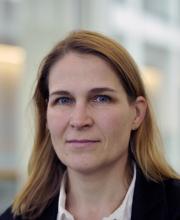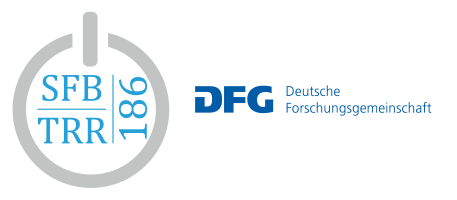
Prof. Dr. Elke Krüger

Universitätsmedizin Greifswald
Institut für Medizinische Biochemie und Molekularbiologie
F.-Sauerbruchstr. Klinikum/ DZ7
17475 Greifswald
Phone: +49 (3834) 86 5400
Fax: +49 (3834) 86 5402
E-mail: elke.krueger@uni-greifswald.de
Molecular Cell Biology, Biochemistry, Immunology
Professor of Medical Biochemistry and Molecular Biology (W3) and Chair of the Institute of Medical Biochemistry and Molecular Biology
2007 Charité award “Personal Research promotion” (career support)
1996 1996 PhD thesis award of the EMAU
1993 - 1996 PhD student stipend and member of the DFG Graduate School „Structural and functional characterization of pro- and eukaryotic genes“ EMAU
1991 - 1992 Student fellowship of the EMAU Greifswald undergraduate program
Academic Education
11/1992 - 06/1996 Ph.D. thesis with Michael Hecker at the Ernst-Moritz-Arndt-University Greifswald (EMAU)
11/1991 - 10/1992 Diploma thesis with Michael Hecker at the EMAU Greifswald
10/1987 - 10/1991 Study of Biology, EMAU Greifswald
University Degrees
2008 Habilitation (venia legendi) in Biochemistry, Charité Universitätsmedizin Berlin, Mentor: Peter-M. Kloetzel
1996 Ph.D. in Microbiology; EMAU Greifswald, Mentor: Michael Hecker (summa cum laude)
1992 Diploma in Molecular Microbiology, Genetics, Biotechnology, and Biochemistry, EMAU Greifswald
Employment
03/2017 - Professor of Medical Biochemistry and Molecular Biology (W3), Chair of the Institute of Medical Biochemistry and Molecular Biology
02/2014 - 02/2017 Professor of Biochemistry at the Charité Universitätsmedizin Berlin (W2 unlimited)
02/2009 - 01/2014 Professor of Biochemistry at the Charité Universitätsmedizin Berlin (W2 Tenure Track)
01/2000 - 01/2009 Group leader at the Institute of Biochemistry, Charité Universitätsmedizin Berlin; “Proteasome assembly”
03/1999 - 12/1999 Postdoctoral researcher with Peter-M. Kloetzel at the Institute of Biochemistry, Charité Universitätsmedizin Berlin
07/1996 - 02/1999 Postdoctoral researcher with Michael Hecker at the Institute for Microbiology EMAU Greifswald, “Bacterial stress responses”; “Bioprocess scale up strategy based on integration of microbial physiology and fluid dynamics”
Coordinating Functions and Editorial Work
2015 - present Deputy Chair Institute of Biochemistry, Charité
2014 - present Director of studies Biochemistry of the Medical Faculty Charité
2009 - present Elected member of gender equality committee of the Medical Faculty Charité
2007 - present Elected member of the steering committee of the SFB740, Project area B “Control of conformation and degradation of proteins”
- Brehm A, LiuY, Sheikh A, Omoyinmi E, Biancotto A, Montealegre G, Reinhardt A, Almeida de Jesus A, Pelletier M, Tsai WL, Remmers EF, Kardava L, Hill S, Zhou Q, Kim H, Lachmann HJ, Megarbane A, Chae JJ, Brady J, Castillo RD, Brown D, Casano AV, Ling G, Plass N, Chapelle D, Huang Y, Stone D, Chen Y, Sotzny F, Lee CCR, Kastner DL,Torrelo A, Zlotogorski A, Moir S, Gadina M, McCoy P, Rother K, Hildebrand PW, Brogan P Krüger E,*1 Aksentijevich I1 , Goldbach-Mansky R.* 1 (2015) Additive loss-of-function proteasome subunit mutations in CANDLE/PRAAS patients promote type I IFN production,*corresponding author 1 equal contribution J Clin Invest. 125:4196-4211.
- Ebstein F, Voigt A, Lange N, Warnatsch A, Schröter A, Prozorovski T, Kuckelkorn U, Aktas O, Seifert U, Kloetzel PM, Krüger E. (2013) Immunoproteasomes Are Important for Proteostasis in Immune Responses. Cell 152:935-937. Correspondence
- Krüger E, Kloetzel PM. (2012) Immunoproteasomes at the interface of innate and adaptive immune responses: two faces of one enzyme. Curr Opin Immunol. 24:77-83.
- Kriegenburg, F, Poulsen EG, Koch A, Krüger E*, and Hartmann-Petersen R. *(2011) Redox control of proteasomal function: From molecular mechanisms to functional significance. Antioxid Redox Signal. 15(8):2265-2299. *corresponding authors
- Steffen J, Seeger M, Koch A, and Krüger E. (2010) Proteasomal degradation is transcriptionally controlled by TCF11 via an ERAD dependent feedback loop. Mol Cell 40(1):147-158.
- Seifert U, Bialy LP, Ebstein F, Bech-Otschir D, Voigt A, Schröter F, Prozorovski T, Lange N, Steffen J, Rieger M, Kuckelkorn U, Aktas O, Kloetzel PM, and Krüger E. (2010) Immunoproteasomes preserve protein homeostasis upon interferon-induced oxidative stress. Cell 142: 613-624.
- Fricke B, Heink S, Kloetzel PM, and Krüger E. (2007) POMP facilitates 20S Proteasome Formation at the Endoplasmic Reticulum. EMBO Rep. 8:1170-1175.
- Heink S., Ludwig D., Kloetzel PM., and Krüger E. (2005) Interferon- induced immune-adaptation of the proteasome system is an accelerated and transient response. Proc Natl Acad Sci U.S.A. 102: 9241-9246.
- Meiners S, Heyken D, Weller A, Ludwig A, Stangl K, Kloetzel PM, Krüger E. (2003) Inhibition of Proteasome Activity Induces Concerted Expression of Proteasome Genes and de novo Formation of Mammalian Proteasomes. J Biol Chem. 278: 21517-21525.
- Krüger E., Zühlke D., Witt E., Ludwig H., and Hecker M. (2001) Clp-mediated proteolysis in Grampositive bacteria is autoregulated by the stability of a repressor. EMBO J. 20:852-863.
